07 January 2020
From a small basement to 2500 participants: How to organise a successful local IT meetup?
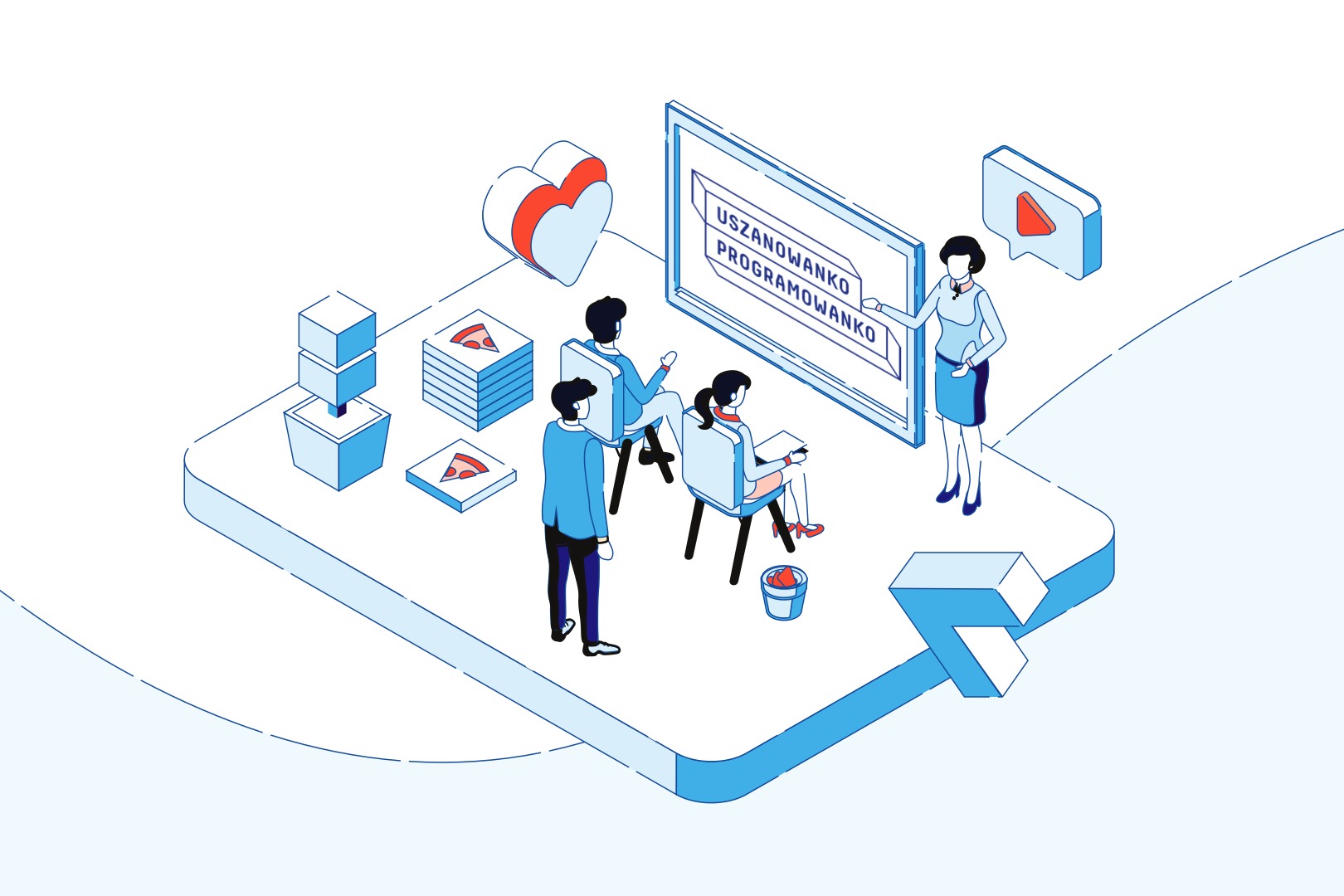
Do you feel like your local IT community has no place to go? Does your town desperately need some space for exchanging technology ideas? Or maybe there’s so much going on but somehow those events lack quality? Don’t wait for miracles, organise something yourself!
In this article, we’ll tell you how to organise a successful local IT meetup, basing on Uszanowanko Programowanko – our monthly event for local developers.
Uszanowanko-what? A few words on the name
Do you remember that Shiba Inu doge meme? It started spreading worldwide around 2010 and became super popular a couple of years later. In Poland, we had our own variation of the meme called Pieseł (from the Polish word “pies” meaning dog).
Since our doge’s catchphrase was „Uszanowanko” we decided to comMEMErate him and used it in the name of our meetup – Uszanowanko Programowanko which could be translated into Howdy Codin’ (BTW: if any Polish person is reading this and has a better idea for translation, feel free to let us know).
We’re not quite sure who came up with the name. Fingers are pointed but nobody claims it – well, let’s just assume that, like with some memes, it just appeared.
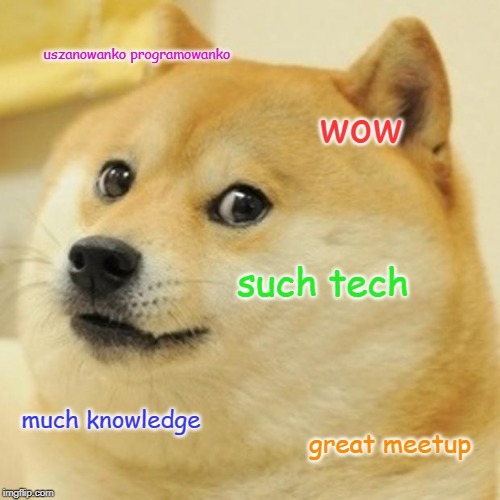
Doge/Pieseł meme has been killed (thanks boomers) and we’ve rebranded but the meetup’s name has its own life now and we don’t intend to change it.
So it begins…
You can say that the godfather of our meetup is our Head of Sales – Marcin Mazurek. Let’s just listen to his part of the story!
“I invited one of our American clients to Gliwice. We’ve worked together for over a year but he never met the team in person. He stayed in town for a week and amongst strategic meetings, setting the vision for his product, we planned some entertainment as well. After a lovely Silesian dinner, James suggested we should go for a tech meetup. Good one James – it’s not the New York City, it’s Gliwice. We’ve checked and there was virtually NOTHING. Our guest suggested that maybe we should organise something by ourselves. We literally had nothing to lose, so I thought – why not.
“A few months before, I had attended a training in Kraków on how to organise a tech meetup. So, I had some general knowledge and a checklist. One of the points was – a foreign guest. We got really lucky because James agreed to be a speaker. However, we needed more specialists so I talked to people in the company and asked for a backup. I already imagined gathering a party in the style of The Lord of the Rings Rivendell scene with You have my bow. Sadly, their enthusiasm in the subject wasn’t as great as mine (at least they admit it now…) but they reluctantly agreed to help with the organisation.
“Even though the whole thing was a bit YOLOesque, I believed in our little meetup. Like I’ve mentioned before, apart from James’ presentation on ethical hacking (checking out whether a website/app is safe and hackerproof) we needed more speakers. Developers weren’t really keen on prepping a presentation but the ones that finally took part saved the meetup.
“We set the date on 6th February 2015 and hoped for the best. It took place in the basement below our office (yes, the title of this blogpost wasn’t misleading), we brought free pizza and beers just to lure potential participants and asked everybody in the company to come and bring friends. We started a Meetup.com event and with the power of word-of-mouth – people started signing up!
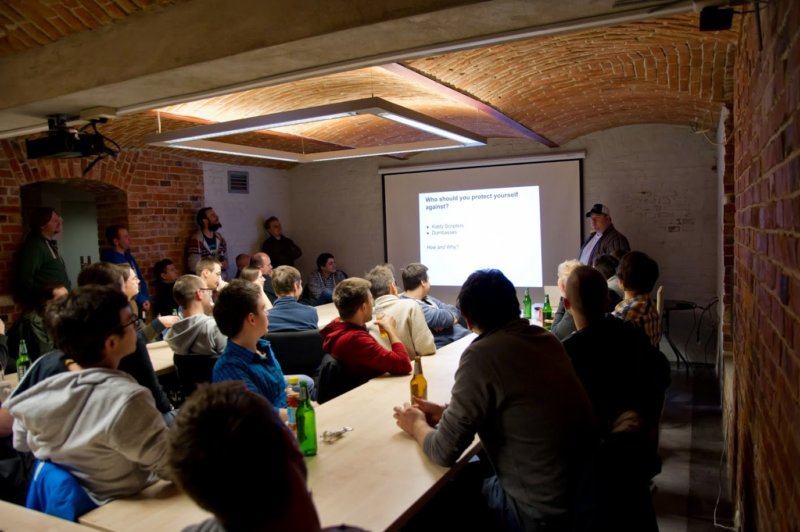
“All in all, 46 people came which absolutely crammed our basement (imagine the queues to a single bathroom we had). We saw a new, unmarked territory – Gliwice simply needed an IT meetup and there wasn’t any! Needless to say, we organised the next one. And then the next one, and then 40 more.
“Do you know what the funniest thing is? That mandatory foreign guest from my checklist was there only once, only at the first meetup.”
After a while, the basement wasn’t good enough anymore. So the time has come to leave the underground. Literally.
Uszanowanko – coming (out) straight from the underground
After 14 events in the basement, we got more experienced in organising meetups, so we thought: why not move to something bigger? 18th June 2016 marked our very first big-scale conference – Frontendalia. It was a one-day event about frontend technologies in a Gliwice student club called Mrowisko (Anthill).
Frontendalia gathered around 120 people, it was completely free of charge and all speakers came from The Software House.
“Before Frontendalia we had max. 50 people on our meetups – mostly friends of friends. Now, we had to speak in front of hundreds of participants. One of our developers brought a moonshine made by his father-in-law – we had a shot for courage before entering the stage “ – laughs Adam Polak, Head of Node.js.
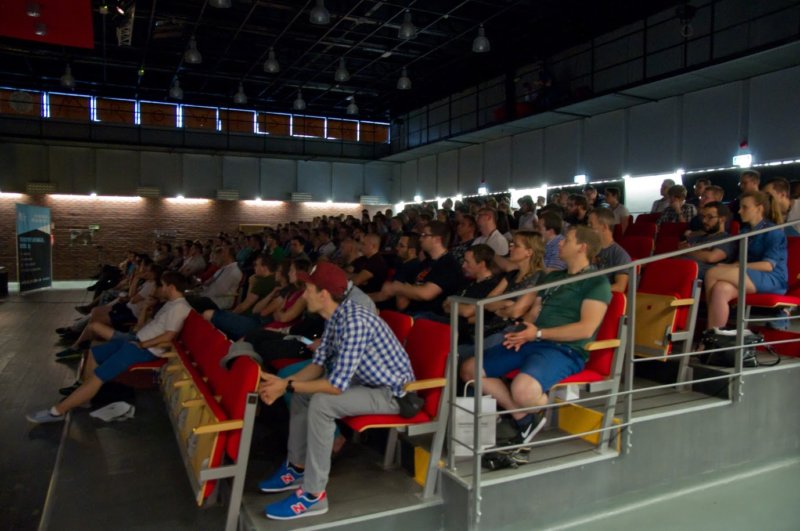
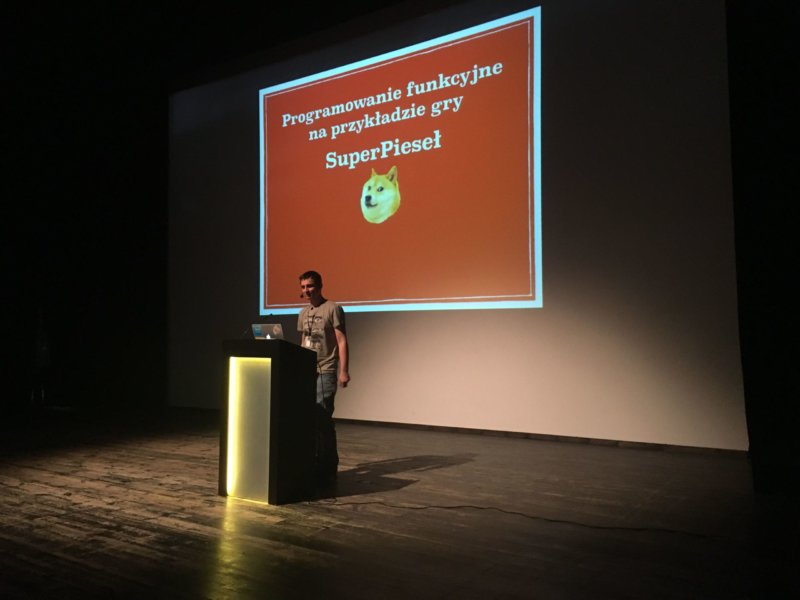
Organising Uszanowanko taught us how to organise a small meetup. Frontendalia, upgraded in size, gave us an important lesson on conferences and planning events in an outside location. All this was crucial to the future of our meetup – we were moving our office to a new location.
Uszanowanko finds a home in the Old Post Office
We’re not going to talk about the whole pandemonium of renovating and adjusting our new office at The Old Post Office in Gliwice. Our CTO has already covered this topic in his article “Is software development like construction?”. What’s important – we already knew that Uszanowanko will continue in our new place and we had to make it accessible for more participants.
“First it was a basement, then a kitchen, so we were kinda sick of half-baking. When we designed a new office we planned a public zone for visitors – an open space for 200 people with a massive screen, reception and access to lots of toilets (we had enough of queues!), everything in the very centre of our new HQ. During the meetups, we just close the rest of the office via access control” – says Mateusz Kubiczek, CEO.
And when you think you’ve planned everything, think again. Just before the first meetup in the new office started, we had a massive mezzanine-gate. Above the sitting area, we have a suspended mezzanine. While arranging sitting places someone said – “what if it falls down and crushes our guests”? The event was hours away and we had to call the architects and builders who had to count the maximum load of the mezzanine. Now, we know its capacity is 50 people and nobody is going to die.
Apart from a brand new space, one more thing changed. “Before moving to the Old Post Office, Mateusz (CEO) and Marcin (Head of Sales) were responsible for leading the event. Now, this is the responsibility of Heads of departments and developers” – notices Adam Polak.
Andrzej Herok, Operations Manager agrees: “The management decided that it’s an event from developers to developers so it’s up to the people in The Software House now to carry this meetup on. In the beginning, it was difficult to convince anyone to become a speaker – now people in the company are genuinely engaged and care about Uszanowanko.”
It started as a small event in the basement with less than 50 people. In 2019, every single meetup hosted over 100 people! Our plans for 2020 are even more ambitious – we’ve already scouted for additional location, the city of Białystok on the other side of the country. Uszanowanko Programowanko is coming there in March to organise a sister-meetup.
Uszanowanko in numbers

What do you need to organise an IT meetup?
Technicalities
The beginnings are pretty straightforward: you need a projector, a piece of empty wall, speakers who know what they’re talking about and some listeners. It’s always a nice idea to share some food and drinks (and no, two pizzas for everybody is definitely not good enough 😉) – people will always show up if there’s something free of charge and lots of laughs.
“At first we didn’t even have microphones or a sound system. Only when we moved to the large office, we realized we need those things or people won’t hear a thing. If something is cool or necessary, don’t be cheap and invest in buying those things for the company” – says Adam Polak.
We are often asked why don’t we live-stream our meetups. Well, we don’t record Uszanowanko because if we did, people wouldn’t come. Let’s face it: as humans, we’re pretty lazy. So, you might say we force people to “physical activity” and integration with colleagues for the area. Streams are for webinars (and guess what – we organise these too, but that’s the topic for a different article).
As far as the content is concerned, Andrzej Herok advises: „You need three specifically selected topics – usually from the same technological area (e.g. frontend, backend, testing, security). If you need ideas, just look at new technologies, trending topics, buzzwords and what makes people generally interested – topics are just generating themselves.” This way you manage your target audience (you know who will come which is good for recruitment purposes; more on that later in the article) but don’t be too specific – if you hit a very little niche, not many people may show up.
Maybe it’s (Captain) obvious but plan breaks, discussions, Q&A session, competitions – anything that will fill the time between speeches and won’t leave your audience idle.
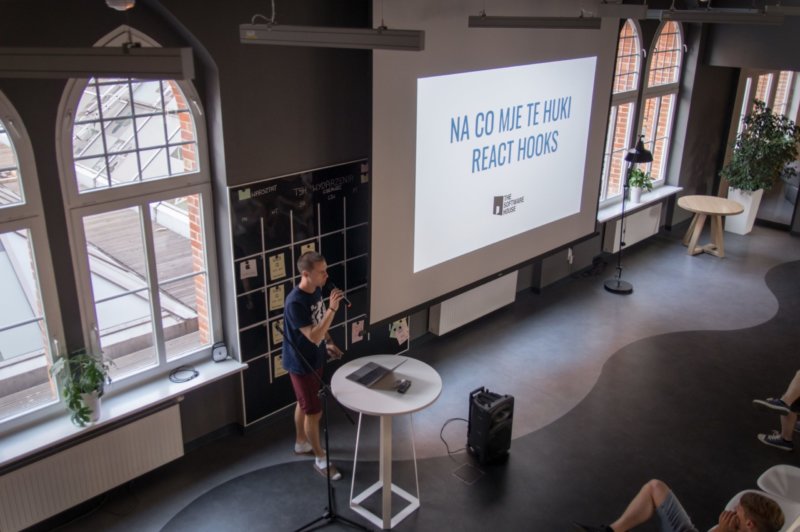
Rehearsals
What distinguishes Uszanowanko from other meetups is the thorough rehearsals process that we take very seriously. We strive to maintain high requirements and standards in order to achieve the high quality of every meetup we organise.
Two weeks before each event there’s a first rehearsal attended by all the speakers, as well as all specialists on the covered subjects we can find in the company and the heads of departments. Such a rehearsal can last a couple of hours – we run through all presentations and give feedback on various aspects:
- Storytelling
“Our CTO, Marek Gajda, always says that a presentation has to tell a story. If content doesn’t include a problem, cause and effect chain, and orderly thought flow – it will confuse, or worse, bore the listeners to death.” – says Adam Polak.
This is probably the most important and most difficult aspect. There’s no fixed way to assure good storytelling but we will give you a method we use. Give developers time to prepare – a month is an absolute minimum. Then encourage them to write a blog article on a similar subject. Researching a subject, preparing the text and working with copywriters gives them a good basis to complete the story and transfer it to the presentation.
- Content
It’s not only about grammar and interpunction but also code review, use of terminology, fact-checking and so on. More difficult topics always require an expert opinion – thanks to this, everybody involved learns something new. “In Uszanowanko’s history, we changed the presentation topic twice. After consultations, we decided that we wouldn’t be able to cover every aspect of the technology in the time given or we didn’t have enough experience with the chosen subject. We’d rather bail on something than present our audience with unreliable information.” – admits Andrzej Herok.
- Layout
It may sound obvious, but the presentation layout is absolutely crucial. Colours, lettering, pictures – they might seem okay on the computer screen but when the presentation is put on the wall via projector, the impression might be completely different. We advise to check and decide on the best layout option beforehand. When you know that everything will be visible and clear to participants, you just generate a set of guidelines for creating presentations. It also makes it easier for speakers to create a presentation when they have a ready-made outline.
- Presentation
“Our priority for any speaker is that they must feel comfortable. In order to achieve that, preparations are in order. You need to learn how to speak, stand and gesture, use microphones and other equipment. If all those areas are covered and the speakers feel prepared, it’s much easier to connect with the audience. Believe it or not, but this also encouraged our people to present with absolutely no stage-fright at other events and conferences (often internationally!).” – reveals Mateusz Kubiczek.
- Equipment
Never underestimate the natural perversity of inanimate objects. We already had really complicated IoT presentations, including coffee machine operated via a smartphone, reinvented light switches to control the light system in the room, a box with a temperature sensor to activate the air conditioning, and so on… Thanks to thorough tests beforehand, we didn’t expect any problems and everything went smoothly.
Having said that, Adam Polak recalls one situation when the equipment malfunctioned: “It was during a heatwave – suddenly the projector disconnected and the sound went off. With over a hundred guests in the room! Rehearsals paid off because nobody panicked, the speaker quickly came up with some cheesy jokes that made everybody laugh and bought us some time to fix things.”
Another crucial issue is room organisation – there are simple things we had to learn the hard way (so now you don’t need to). Seats must be arranged in a combination that allows everybody to see clearly with no obstructions. The microphone works best if you teach people how to hold it properly. To achieve the best sound, configure the mic with the person who speaks the quietest.
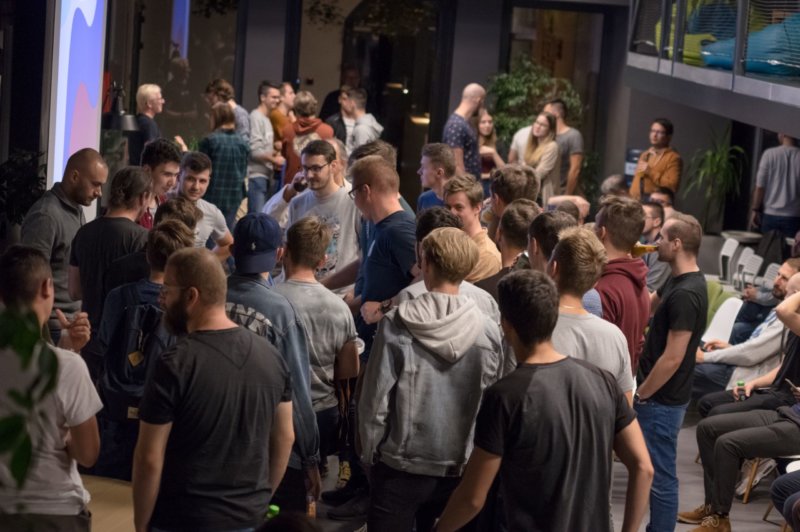
Open approach
We organise Uszanowanko in our office for multiple reasons – one of them is openness towards developers. People come to see not only presentations but also a local landmark with over 100 years of history and an awarded office space. People were so keen to see what we did with the place that we organised a short trip around the building. We don’t mind it though – as Mateusz Kubiczek says – „we already noticed that there are several types of participants: people interested in getting a job who scout the location, regulars who carpool from different cities, developers interested only in their field who show up at the particular events, and pizza grazers – all equally welcome.”
Some of you might be concerned about the damage – nothing has ever disappeared, got broken, shattered or spilt. The only loss we’ve suffered were onions stolen from the kitchen. Tears were shed but we hope the person responsible cried more while peeling them. Never forget.🧅[*]
Perseverance
There were countless times when we wanted to stop organising our meetup: we were swamped with projects, there were no volunteers for presentations, we didn’t have original ideas. But we’re stubborn and always push things forward. And it pays off. Lidia Łoniewska, HR Manager noticed that „compared to other meetups, Uszanowanko consistently takes its place every month. We developed a habit in our participants and if we weren’t consistent, we would immediately lose them. The audience doesn’t demand rocket science – we constantly notice that people are keener to give compliments to the speakers rather than criticise them, so there’s nothing to be afraid of.”
Meetups support your software company by…
Creating a place to exchange opinions on new technologies
According to Mateusz Kubiczek: “CTOs often mention that meetups are a great way for them to find out what’s going on in tech and we genuinely just want to share knowledge. Any business benefits for our company are just by-products. We’re not afraid of revealing details and so-called company secrets because all this information is already available online, we only organise it and put it in appropriate contexts. Plus, we often use free open-source projects so we would be massive hypocrites if we kept all this to ourselves.”
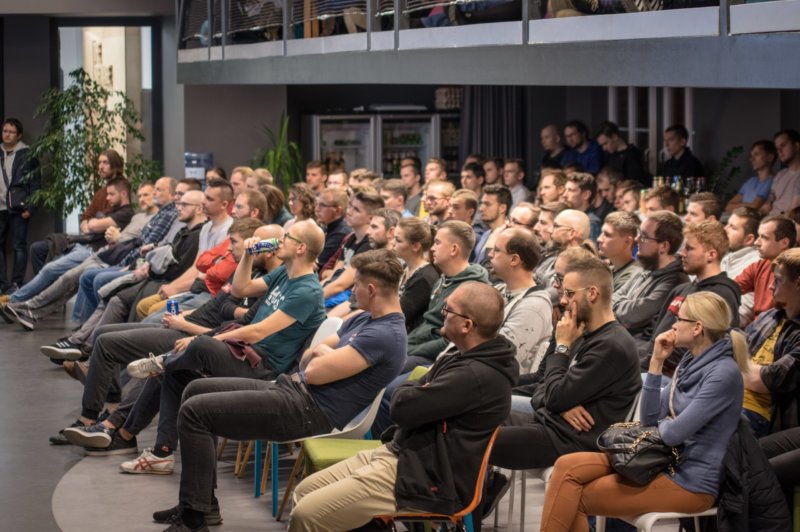
Acquiring new developers to join your company
Organising a meetup means showing off your company – there’s no doubt about it. Some people present at the audience might get inspired and care for joining your team. Guess what? It happens all the time!
“Uszanowanko hosts over a hundred people on a single event. During networking, young developers approach the speakers and ask about the possibility of recruitment. Some people made a goal of getting into The Software House but are scared of sending a CV because they are not confident with their skills. The meetup is a perfect occasion for them to meet us in person, see that we’re pretty chilled and not scary at all. It’s beneficial for us too: it’s easier to recruit on our own ground because we know all the cool features of the office that might be interesting for the candidates (the crown jewel always seems to be the beer fridge…🙊). Right now, we have a lot of people who started as Uszanowanko regulars and now work with us” – explains Lidia Łoniewska.
But that’s not all, Adam Polak noticed a very interesting phenomenon: “When I or other heads of departments check the recruitment tasks, we see that candidates use methods and practices they’ve learned on Uszanowanko. They see that we are trustworthy and what we show during meetups is legit and tested. It makes us so happy!”
Read more: Create strategies to improve skills for your team 👇
Winning customers
Meetup is a direct way to show off and present specialist knowledge of what the company does. And that increases the company’s rank in the eyes of potential customers.
„On a local scale, Uszanowanko is already a brand itself. We know for a fact that some companies sent their developers to our meetup to spy whether we actually know what we talk about. The result must have been positive though because we started a cooperation with one client this way” – says Mateusz Kubiczek.
Inspiring other meetups
According to Adam Polak: “I think it won’t be an exaggeration if I say that Uszanowanko has caused a meetup boom locally. Now, virtually every IT company in Silesia has its meetup (in many different forms). We used to be mindful to other events so no meetups would clash at the same time. Now, we’ve grown and got a dedicated fanbase so we’re not afraid that people won’t show up. Planning around is not a thing anymore.”
Improving organisational skills
Organising a meetup made us feel more confident in organising… basically anything else. Now, we conduct real-time online webinars, practical workshops for developers (already trained people in React and Node.js), and engage as the main partner of meet.js summit conference. “We often get feedback that basically anything we organise is really cool, presentations make sense and keep high quality.
It takes time and effort but as you can see the benefits for the company are countless.” – concludes Adam Polak. However, the biggest winners here are developers who are involved in organisation and presentations.
How IT meetups benefit software developers?
Activating your own team
“From the perspective of human resources – organising a meetup is priceless for the team. In the beginning, It took a lot of talking and convincing to tactically force people to present (sorry, not sorry). But how it paid off! Now, people are coming up with subjects all the time so we can plan months ahead. By teaching others, our developers improve their own skills, become specialists in a given field and sometimes they grow into experts. Some developers who regularly present at Uszanowanko are invited to outside conferences like meet.js summit or 4Developers events, often with exactly the same topics!” – says Lidia Łoniewska.
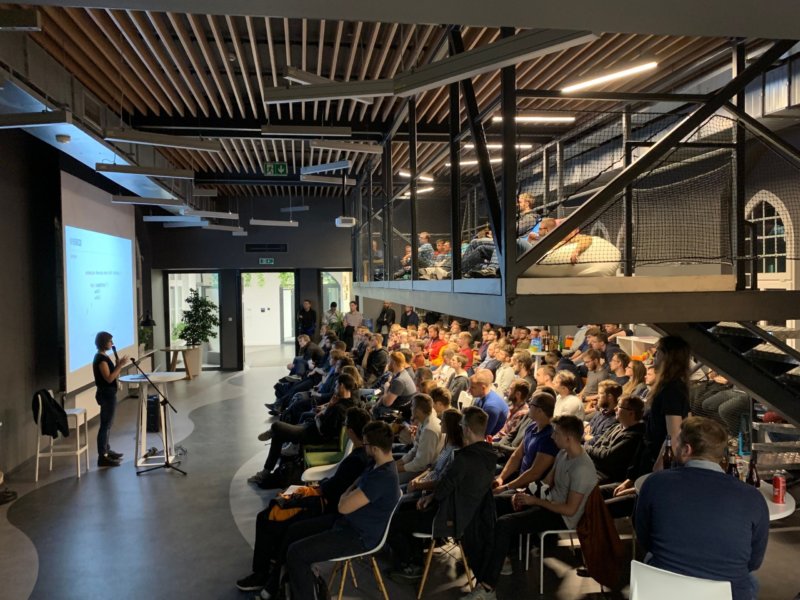
Stabilizing the company’s position in the local IT community
Adam Polak and Andrzej Herok both agree that on one hand, we want to be a local expert and on the other, we can’t afford to make any mistakes in our presentations. “We’re not a pee-wee league anymore. If we teach the audience a method that’s not working, the mistake won’t be replicated by five people but by hundred. They pass it onto their friends, it’s hundreds more. And then it will be our fault” – says the Head of Node.js.
Sometimes we like it to be “our fault” though. As our Operation Manager says: “After one of the presentations the speaker was surrounded by people who wanted to know more. The technology was pretty new and there weren’t any quality materials on the subject in Polish yet. As a result, our speaker was invited to another conference, received a lot of question regarding the technology and grew to be a local ‘go-to’ source.”
Gaining charisma
Public appearances give developers confidence. The best way to teach them the presentation skills and upgrade their charisma is by giving them a meetup presentation assignment. We’ve already noticed that developers who even once spoke during an Uszanowanko event, tend to make a much better impression in front of clients during meetings, sprints or demos.
“We teach people how to handle crowds, how to work with an audience, what to do if you get stuck (tip: always have a glass of water next to you – taking a sip can buy you a few seconds to collect your thoughts)” – says Adam Polak.
Improving technical skills
Sometimes we want to get familiar with certain technology but we don’t want to do it on a live project via try and error method. Instead, we ask if somebody would like to learn it and then teach the rest of the team. A good example of this practice is WebAssembly – we asked our Frontend Developer to get familiar with it and then prepare a presentation, write a blog article about it and then lead a Q&A session with the Frontend Team. That’s how you get a specialist!
The final thought
We’re not gonna lie – organising a meetup is a lot of hard work and dedication from the entire company. More than once you’ll have enough but it’s worth all the blood, sweat and tears. It’s very rewarding when total strangers appreciate what you do and your company turns into their go-to when they look for professional advice.
It’s also amazing to watch how our shy colleagues turn into entertaining powerhouses, oozing charisma. In the words of Adam Polak: “We have created a high-quality brand where our average is proficient for others. And it’s so satisfying.”
Check it out and when you can join the next Uszanowanko Programowanko 🚀
Sign up for meetup and take best from the knowledge of the best! 📖

